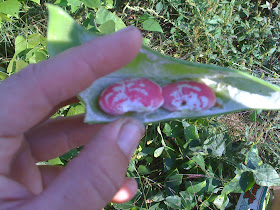My friend Liz just sent me this great article about a study done at Pennsylvania's Rodale Institute. Take a moment and read why organic is the wave of the future.
Study debunks myths on organic farms
By Paul Hanley, Special to The StarPhoenix
September 27, 2011
The results are in from a 30-year side-by-side trial
of conventional and organic farming methods at Pennsylvania's Rodale
Institute. Contrary to conventional wisdom, organic farming outperformed
conventional farming in every measure.
There are about 1,500
organic farmers in Saskatchewan, at last count. They eschew the
synthetic fertilizers and toxic sprays that are the mainstay of
conventional farms. Study after study indicates the conventional
thinking on farming - that we have to tolerate toxic chemicals because
organic farming can't feed the world - is wrong.
In fact, studies
like the Rodale trials (www.rodaleinstitute.org/ fst30years) show that
after a three-year transition period, organic yields equalled
conventional yields. What is more, the study showed organic crops were
more resilient. Organic corn yields were 31 per cent higher than
conventional in years of drought.
These drought yields are
remarkable when compared to genetically modified (GM) "drought tolerant"
varieties, which showed increases of only 6.7 per cent to 13.3 per cent
over conventional (non-drought resistant) varieties.
More
important than yield, from the farmer's perspective, is income, and here
organic is clearly superior. The 30-year comparison showed organic
systems were almost three times as profitable as the conventional
systems. The average net return for the organic systems was $558/acre/
year versus just $190/acre/year for the conventional systems. The much
higher income reflects the premium organic farmers receive and consumers
pay for.
But even without a price premium, the Rodale study found
organic systems are competitive with the conventional systems because
of marginally lower input costs.
The most profitable grain crop
was the organically grown wheat netting $835/acre/year. Interestingly,
no-till conventional corn was the least profitable, netting just
$27/acre/year. The generally poor showing of GM crops was striking; it
echoed a study from the University of Minnesota that found farmers who
cultivated GM varieties earned less money over a 14-year period than
those who continued to grow non-GM crops.
Importantly, the Rodale
study, which started in 1981, found organic farming is more sustainable
than conventional systems. They found, for example, that:
. Organic systems used 45 per cent less energy than conventional.
.
Production efficiency was 28 per cent higher in the organic systems,
with the conventional no-till system being the least efficient in terms
of energy usage.
. Soil health in the organic systems has
increased over time while the conventional systems remain essentially
unchanged. One measure of soil health is the amount of carbon contained
in the soil. Carbon performs many crucial functions: acting as a
reservoir of plant nutrients, binding soil particles together,
maintaining soil temperature, providing a food source for microbes,
binding heavy metals and pesticides, and influencing water holding
capacity and aeration. The trials compared different types of organic
and conventional systems; carbon increase was highest in the organic
manure system, followed by the organic legume system. The conventional
system has shown a loss in carbon in recent years.
.
Organic fields increased groundwater recharge and reduced run-off.
Water volumes percolating through the soil were 15-20 per cent higher in
the organic systems. Rather than running off the surface and taking
soil with it, rainwater recharged groundwater reserves in the organic
systems, with minimal erosion.
Organic farming also helps sustain
rural communities by creating more jobs; a UN study shows organic farms
create 30 per cent more jobs per hectare than nonorganic. More of the
money in organic farming goes to paying local people, rather than to
farm inputs.
With results like these, why does conventional wisdom
favour chemical farming? Vested interests. Organic farming keeps more
money on the farm and in rural communities and out of the pockets of
chemical companies. As the major funders of research centres and
universities, and major advertisers in the farm media, they effectively
buy a pro-chemical bias.
Still, the global food security
community, which focuses on poor farmers in developing countries, is
shifting to an organic approach. Numerous independent studies show that
small scale, organic farming is the best option for feeding the world
now and in the future. In fact, agroecological farming methods,
including organic farming, could double global food production in just
10 years, according to one UN report.
© Copyright (c) The StarPhoenix



















































